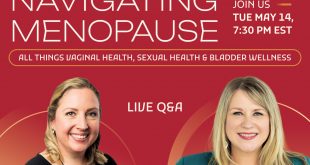 Many individuals have a difficult time finding ways to manage stress. In stressful situations, our brains’ complex anatomy and process work to produce fear, anxiety, worry, and the decision to take flight or to fight. There are neurotransmitters throughout the entire body that send signals to the brain, alerting us instantaneously of real or perceived danger. Stress, anxiety, and depression generate both psychological and physical symptoms.
Many individuals have a difficult time finding ways to manage stress. In stressful situations, our brains’ complex anatomy and process work to produce fear, anxiety, worry, and the decision to take flight or to fight. There are neurotransmitters throughout the entire body that send signals to the brain, alerting us instantaneously of real or perceived danger. Stress, anxiety, and depression generate both psychological and physical symptoms.
We caught up with Dr. Rina Bhalani of BayCare Medical Group to find out her perspective on natural and medical treatments for stress and anxiety.
H&W: How does stress correlate to physical illness?
Dr. Bhalani: Increased and uncontrolled stress can affect all systems of the body and increase our chances of developing physical illnesses. One area stress affects our organ’s functions is musculoskeletal. When we are stressed, it tenses up our muscles, causing muscle pain and tension headaches. Another is the respiratory system, which can cause shortness of breath, and the cardiovascular systems can also be affected, which can lead to stress on the heart. There is an increased risk of heart disease and hypertension with chronic stress. Stress can affect our GI (gastrointestinal) system, nervous system, endocrine system, and even the reproductive system.
H&W: What are some natural methods to combat stress?
Dr. Bhalani: Some natural ways to control stress are meditation/mindfulness, yoga, exercise, eating healthy and overall working on lifestyle modifications. There are many apps and online videos to help practice meditation and yoga. It definitely takes practice, so starting off slow and working your way up is best. Another great way to manage stress levels is through behavioral therapy, including counseling.
H&W: What are some medical treatments available for those who suffer from chronic stress or PTSD?
Dr. Bhalani: In addition to the natural methods mentioned above, medications can help with chronic stress and PTSD (post-traumatic stress disorder).
The first treatment of choice is selective serotonin reuptake inhibitors (SSRIs) or Serotonin-norepinephrine reuptake inhibitors (SNRIs) if SSRIs are not tolerated/side effects.
H&W: When should patients seek help? How do they know when it’s time to get medical care for stress and anxiety?
Dr. Bhalani: Patients should seek help from their doctor when they start having symptoms that are affecting them or their daily function/routine. For example, due to stress and anxiety, they are experiencing chronic tension headaches, elevated blood pressure, GI symptoms, etc. It is essential to control stress and anxiety levels, so it does not cause further damage to the body, and there are many ways to do so; just talk to your doctor about what methods are best for you.
Comprehensive Treatment for Stress, Anxiety and Depression
In order to overcome stress and pain, we need a well-rounded treatment protocol that incorporates medication (if necessary), stress management, nutrition, exercise, meditation, hormone balancing, and other therapies that can help to stabilize our systems.
Chronic stress can lead to depression. If you notice that you or someone you know has difficulty managing anxiety and depression or has suicidal tendencies, please seek medical intervention or call the suicide hotline.
Seek Help Immediately
Nearly 15 million people in the United States are affected by depression. If you are depressed for an extended period of time and can’t seem to move beyond it, please contact your doctor, therapist, or a suicide hotline. Therapy appointments are also available online for your convenience. National Suicide Prevention Hotline: 800-273-8255.
Rina Bhalani, M.D.
Dr. Rina Bhalani is board certified in family medicine and part of BayCare Medical Group in St. Petersburg, Florida. She received her undergraduate degree in biology from Nova Southeastern University in Fort Lauderdale, Florida. She then earned her Doctor of Medicine degree from Ross University School of Medicine in Portsmouth, Dominica. Dr. Bhalani furthered her medical education by completing a family medicine residency at Indiana University Health in Indianapolis, Indiana. Dr. Bhalani treats a range of conditions, and she is eager to help the wider community receive the care they deserve. She has expansive experience and high interest in Women’s Health. During her consultations, Dr. Bhalani fully explains patients’ conditions and helps them choose an appropriate treatment plan, where she will actively invest in providing a course of preventative care that will leave a positive impression upon the patient. She is a member of the American Academy of Family Practice, also certified in basic life support, advanced cardiac life support, neonatal resuscitation and is fluent in Gujarati.
Dr. Bhalani is accepting new patients.
Please call (727) 561-2600 to schedule your appointment.
BayCare Medical Group
Primary Care
900 Carillon Pkwy Ste 308
Saint Petersburg, FL 33716
(727) 561-2600
Dr. Bhalani is accepting new patients age 12 and older. Please visit DrRinaBhalani.org to schedule an appointment.
 Central Florida Health and Wellness Magazine Health and Wellness Articles of the Villages
Central Florida Health and Wellness Magazine Health and Wellness Articles of the Villages


